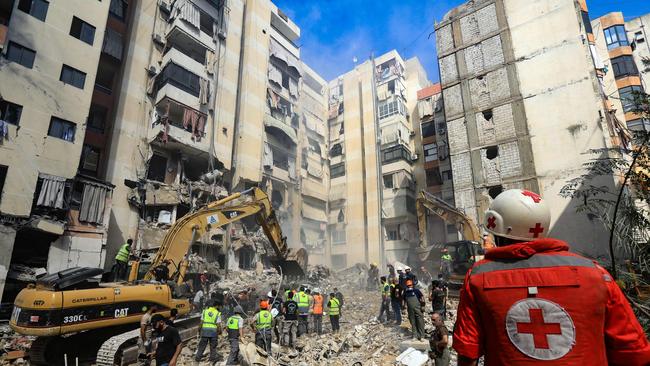Israeli attacks on Hezbollah put Tehran on notice
Israel shows the damage the Iran-backed militia will suffer in a full-scale war, says the editorial board of The Wall Street Journal.

Israel appears to be pursuing a new strategy to deter a broader war with Hezbollah.
Instead of tit-for-tat exchanges, it will make clear to the Iran-backed militia the damage it will suffer if it continues to fire missiles at Israel’s north.
That’s the conclusion we draw after a week of strikingly effective attacks on the Hezbollah war machine in Lebanon. The latest, on Friday, was a targeted strike on Hezbollah’s Beirut stronghold of Dahiyeh.
Israel says it killed Ibrahim Aqil, the commander of Hezbollah’s elite Radwan force, as well as some 10 commanders with whom he was meeting to plan attacks.
Since Israel’s July assassination of Fuad Shukr, Hezbollah’s military chief-of-staff, Aqil is believed to have become the group’s de facto military chief.
Aqil also had a $US7m ($10.3m) American bounty on his head for two 1983 truck bombings that killed more than 300 people at the US embassy and Marines barracks in Beirut. For years, he commanded Hezbollah’s operations in Syria, helping dictator Bashar al-Assad massacre his own Arab people and building a close relationship with Russian forces. These are the kind of people Israel is fighting.
Hezbollah has tasked its Radwan force with Operation Conquer the Galilee — think October 7, but in Israel’s north and publicised in advance. US President Joe Biden has said he is committed to preventing another October 7-style attack, and Israeli strikes such as this are the way to do it. Israel has broken the familiar pattern with Hezbollah to launch deterrent attacks such as the sabotage of Hezbollah pagers.
Iran’s terrorist axis has taken serious blows, and the region is on edge. On Friday Hezbollah fired 200 rockets at Israel, but it has to be considering its options. If its leader, Hassan Nasrallah, chooses to escalate, he now knows his Beirut bastion won’t be immune. His organisation has been compromised, which means he may also be at risk.
A full-scale war could destroy Lebanon and carry risks for Israel too. It could also hurt Kamala Harris politically and help the Trump campaign. Nasrallah could end up facing Donald Trump and Benjamin Netanyahu for several more years. That is a prospect neither he nor his Iranian bosses want.
Israel made clear for 11 months that it didn’t want this fight with Hezbollah. Even as 8500 Hezbollah rockets forced the depopulation of Israel’s north, it limited its responses. But diplomacy went nowhere as Nasrallah tied Hezbollah’s actions to a Gaza ceasefire. This has mortgaged the future of Lebanon to the priorities of Hamas’s Yahya Sinwar.
Even the Biden administration has now recognised that Sinwar doesn’t want a deal. Maybe Nasrallah would like to have a word with him? One way or another, Israel is going to return its 60,000 displaced northern citizens to their homes.



To join the conversation, please log in. Don't have an account? Register
Join the conversation, you are commenting as Logout